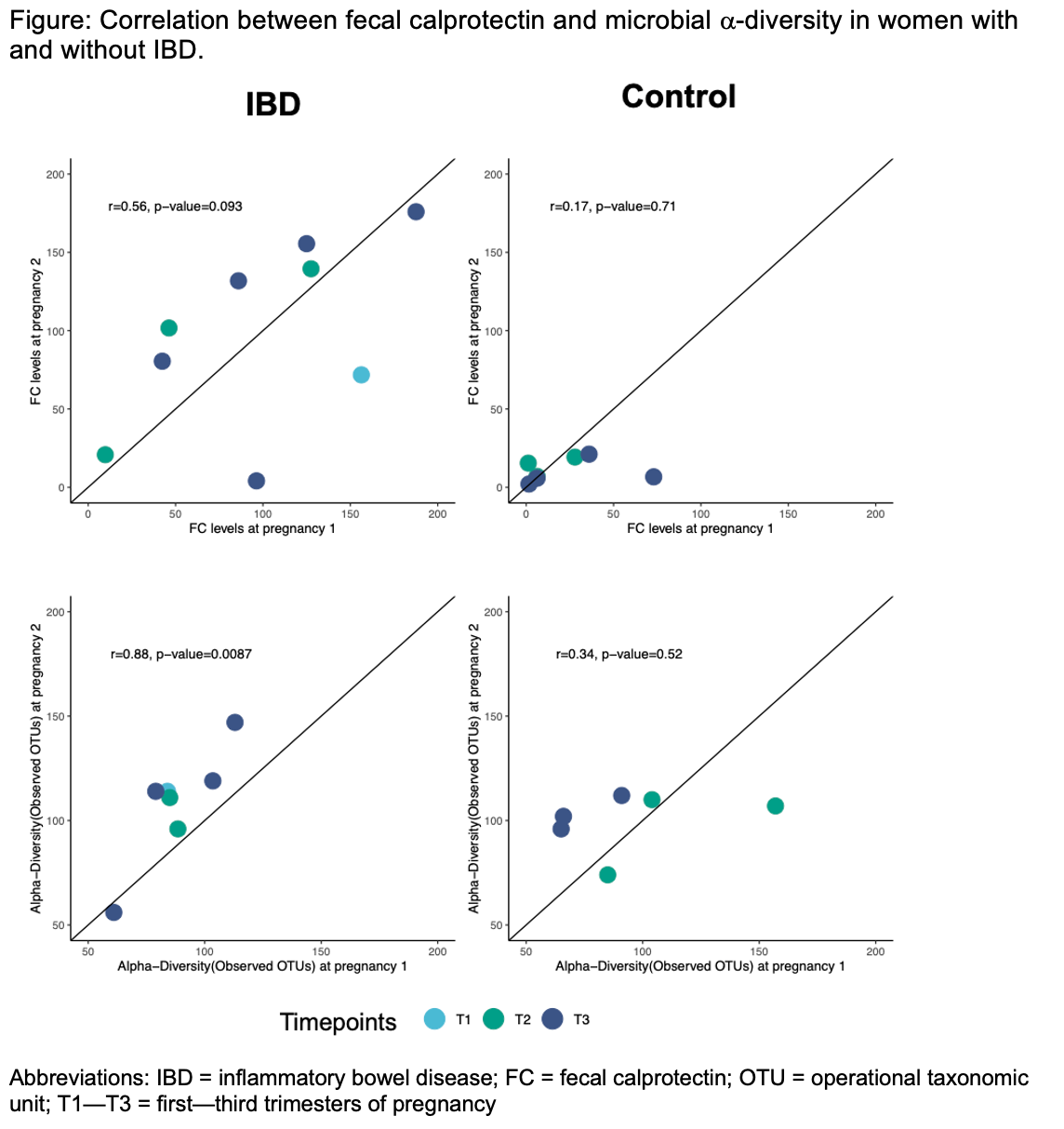P048 Intestinal inflammation and microbiome diversity are conserved more in consecutive pregnancies among women with inflammatory bowel disease compared to healthy controls
Agrawal, M.(1);Tarassishin, L.(2);Rendon, A.(2);Hillenbrand, C.(2);Debebe, A.(2);White, S.(2);Eisele, C.(2);Hawkins, K.(2);Kim, E.S.(2,3);Thjømøe, A.(4);Mørk, E.(4);Chen, C.L.(5);Kornbluth, A.(1);George, J.(1);Legnani, P.(1);Maser, E.(1);Stone , J.(6);Dubinsky, M.(7);Sabino, J.(1,8);Torres, J.(1,9);Colombel, J.F.(1);Peter, I.(2);Hu, J.(2);
(1)Icahn School of Medicine at Mount Sinai, The Henry D. Janowitz Division of Gastroenterology, New York, United States;(2)Icahn School of Medicine at Mount Sinai, Department of Genetics and Genomic Sciences, New York, United States;(3)Kyungpook National University School of Medicine, Department of Internal Medicine, Daegu, Korea- Republic Of;(4)Calpro AS, Lysaker, Norway;(5)Icahn School of Medicine at Mount Sinai, Department of Obstetrics- Gynecology and Reproductive Science, New York, United States;(6)Icahn School of Medicine at Mount Sinai, Division of Maternal Fetal Medicine- Department of Obstetrics- Gynecology and Reproductive Science, New York, United States;(7)Icahn School of Medicine at Mount Sinai, Department of Pediatric Gastroenterology and Nutrition, New York, United States;(8)University Hospital of Leuven, Gastroenterology Division, Leuven, Belgium;(9)Hospital Beatriz Ângelo, Division of Gastroenterology- Surgical Department, Loures, Portugal
Background
There are increasing data on changes in intestinal inflammation and microbiome diversity during pregnancy in women with inflammatory bowel disease (IBD) with implications towards individual and offspring immune function. However, differences in intestinal inflammation, as measured by fecal calprotectin (FC) and microbial a-diversity, in consecutive pregnancies are not known.
Methods
We prospectively enrolled a cohort of women, 37 with IBD and 39 without IBD, during two consecutive pregnancies, and their offspring. We collected serial stool samples and clinical data, and measured FC and bacterial abundance during each trimester of each pregnancy. We further performed correlation analysis between FC in consecutive pregnancies and between microbial a-diversity in consecutive pregnancies among women with and without IBD.
Results
Compared to healthy controls, IBD pregnancies had significantly lower gestational age at birth and higher frequency of Cesarean section. Mode of delivery, the status of Group B Streptococcus (GBS) infection and GBS infection prophylaxis were significantly associated with the pregnancy order in both IBD and controls (Table). Furthermore, we observed strong correlations of FC (r=0.56, p-value=0.093) and microbial alpha-diversity assessed as operational taxonomic unit (OTU) richness (r=0.88, p=0.0087) between paired consecutive pregnancies in women with IBD, but not in those without IBD (Figure). There were no differences in microbial alpha-diversity using the Shannon and Simpson indices when comparing consecutive pregnancies of women with and without IBD.

Conclusion
In this study, we demonstrate that intestinal inflammation and microbiome diversity are more conserved in consecutive pregnancies of women with IBD compared to healthy controls. These findings may have implications towards understanding the impact of pregnancy on host-microbiome interactions in IBD as well as the potential impact on offspring health.


